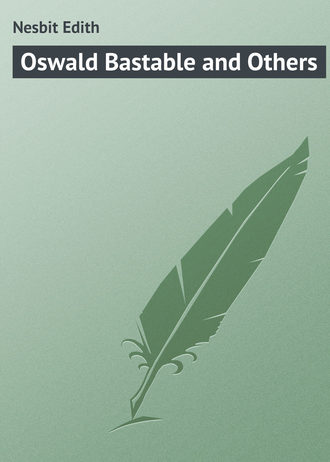
Эдит Несбит
Oswald Bastable and Others
THE TWOPENNY SPELL
Lucy was a very good little girl indeed, and Harry was not so bad – for a boy, though the grown-ups called him a limb! They both got on very well at school, and were not wholly unloved at home. Perhaps Lucy was a bit of a muff, and Harry was certainly very rude to call her one, but she need not have replied by calling him a 'beast.' I think she did it partly to show him that she was not quite so much of a muff as he thought, and partly because she was naturally annoyed at being buried up to her waist in the ground among the gooseberry-bushes. She got into the hole Harry had dug because he said it might make her grow, and then he suddenly shovelled down a heap of earth and stamped it down so that she could not move. She began to cry, then he said 'muff' and she said 'beast,' and he went away and left her 'planted there,' as the French people say. And she cried more than ever, and tried to dig herself out, and couldn't, and although she was naturally such a gentle child, she would have stamped with rage, only she couldn't get her feet out to do it. Then she screamed, and her Uncle Richard came and dug her out, and said it was a shame, and gave her twopence to spend as she liked. So she got nurse to clean the gooseberry ground off her, and when she was cleaned she went out to spend the twopence. She was allowed to go alone, because the shops were only a little way off on the same side of the road, so there was no danger from crossings.
'I'll spend every penny of it on myself,' said Lucy savagely; 'Harry shan't have a bit, unless I could think of something he wouldn't like, and then I'd get it and put it in his bread and milk!' She had never felt quite so spiteful before, but, then, Harry had never before been quite so aggravating.
She walked slowly along by the shops, wishing she could think of something that Harry hated; she herself hated worms, but Harry didn't mind them. Boys are so odd.
Suddenly she saw a shop she had never noticed before. The window was quite full of flowers – roses, lilies, violets, pinks, pansies – everything you can think of, growing in a tangled heap, as you see them in an old garden in July.
She looked for the name over the shop. Instead of being somebody or other, Florist, it was 'Doloro de Lara, Professor of white and black Magic,' and in the window was a large card, framed and glazed. It said:
ENCHANTMENTS DONE WHILE YOU WAIT
EVERY DESCRIPTION OF CHARM
CAREFULLY AND COMPETENTLY WORKED
STRONG SPELLS FROM FIFTY GUINEAS
TO TUPPENCE
WE SUIT ALL PURSES
GIVE US A TRIAL
BEST AND CHEAPEST HOUSE IN THE TRADE
COMPETITION DEFIED
Lucy read this with her thumb in her mouth. It was the tuppence that attracted her; she had never bought a spell, and even a tuppenny one would be something new.
'It's some sort of conjuring trick, I suppose,' she thought, 'and I'll never let Harry see how it's done – never, never, never!'
She went in. The shop was just as flowery, and bowery, and red-rosy, and white-lilyish inside as out, and the colour and the scent almost took her breath away. A thin, dark, unpleasing gentleman suddenly popped out of a bower of flowering nightshade, and said:
'And what can we do for you to-day, miss?'
'I want a spell, if you please,' said Lucy; 'the best you can do for tuppence.'
'Is that all you've got?' said he.
'Yes,' said Lucy.
'Well, you can't expect much of a spell for that,' said he; 'however, it's better that I should have the tuppence than that you should; you see that, of course. Now, what would you like? We can do you a nice little spell at sixpence that'll make it always jam for tea. And I've another article at eighteenpence that'll make the grown-ups always think you're good even if you're not; and at half a crown – '
'I've only got tuppence.'
'Well,' he said crossly, 'there's only one spell at that price, and that's really a tuppenny-half-penny one; but we'll say tuppence. I can make you like somebody else, and somebody else like you.'
'Thank you,' said Lucy; 'I like most people, and everybody likes me.'
'I don't mean that,' he said. 'Isn't there someone you'd like to hurt if you were as strong as they are, and they were as weak as you?'
'Yes,' said Lucy in a guilty whisper.
'Then hand over your tuppence,' said the dark gentleman, 'and it's a bargain.'
He snatched the coppers warm from her hand.
'Now,' he said, 'to-morrow morning you'll be as strong as Harry, and he'll be little and weak like you. Then you can hurt him as much as you like, and he won't be able to hurt back.'
'Oh!' said Lucy; 'but I'm not sure I want – I think I'd like to change the spell, please.'
'No goods exchanged,' he said crossly; 'you've got what you asked for.'
'Thank you,' said Lucy doubtfully, 'but how am I – ?'
'It's entirely self-adjusting,' said nasty Mr. Doloro. 'No previous experience required.'
'Thank you very much,' said Lucy. 'Good – '
She was going to say 'good-morning,' but it turned into 'good gracious,' because she was so very much astonished. For, without a moment's warning, the flower-shop had turned into the sweet-shop that she knew so well, and nasty Mr. Doloro had turned into the sweet-woman, who was asking what she wanted, to which, of course, as she had spent her twopence, the answer was 'Nothing.' She was already sorry that she had spent it, and in such a way, and she was sorrier still when she got home, and Harry owned handsomely that he was sorry he had planted her out, but he really hadn't thought she was such a little idiot, and he was sorry – so there! This touched Lucy's heart, and she felt more than ever that she had not laid out her tuppence to the best advantage. She tried to warn Harry of what was to happen in the morning, but he only said, 'Don't yarn; Billson Minor's coming for cricket. You can field if you like.' Lucy didn't like, but it seemed the only thing she could do to show that she accepted in a proper spirit her brother's apology about the planting out. So she fielded gloomily and ineffectively.
Next morning Harry got up in good time, folded up his nightshirt, and made his room so tidy that the housemaid nearly had a surprise-fit when she went in. He crept downstairs like a mouse, and learned his lessons before breakfast. Lucy, on the other hand, got up so late that it was only by dressing hastily that she had time to prepare a thoroughly good booby-trap before she slid down the banisters just as the breakfast-bell rang. She was first in the room, so she was able to put a little salt in all the tea-cups before anyone else came in. Fresh tea was made, and Harry was blamed. Lucy said, 'I did it,' but no one believed her. They said she was a noble, unselfish sister to try and shield her naughty brother, and Harry burst into floods of tears when she kicked him under the table; she hated herself for doing this, but somehow it seemed impossible to do anything else.
Harry cried nearly all the way to school, while Lucy insisted on sliding along all the gutters and dragging Harry after her. She bought a catapult at the toy-shop and a pennyworth of tintacks at the oil-shop, both on credit, and as Lucy had never asked for credit before, she got it.
At the top of Blackheath Village they separated – Harry went back to his school, which is at the other side of the station, and Lucy went on to the High School.
The Blackheath High School has a large and beautiful hall, with a staircase leading down into it like a staircase in a picture, and at the other end of the hall is a big statue of a beautiful lady. The High School mistresses call her Venus, but I don't really believe that is her name.
Lucy – good, gentle, little Lucy, beloved by her form mistress and respected by all the school – sat on those steps – I don't know why no one caught her – and used her catapult to throw ink pellets (you know what they are, of course) with her catapult at the beautiful white statue-lady, till the Venus – if that is her name, which I doubt – was all over black spots, like a Dalmation or carriage dog.
Then she went into her class room and arranged tintacks, with the business end up, on all the desks and seats, an act fraught with gloomy returns to Blossoma Rand and Wilhelmina Marguerite Asterisk. Another booby-trap – a dictionary, a pot of water, three pieces of chalk, and a handful of torn paper – was hastily sketched above the door. Three other little girls looked on in open-mouthed appreciation. I do not wish to shock you, so I will not tell you about the complete success of the booby-trap, nor of the bloodthirsty fight between Lucy and Bertha Kaurter in a secluded fives-court during rec. Dora Spielman and Gertrude Rook were agitated seconds. It was Lucy's form mistress, the adored Miss Harter Larke, who interrupted the fight at the fifth round, and led the blood-stained culprits into the hall and up the beautiful picture-like steps to the Headmistress's room.
The Head of the Blackheath High School has all the subtle generalship of the Head in Mr. Kipling's 'Stalky.' She has also a manner which subdues parents and children alike to 'what she works in, like the dyer's hand.' Anyone less clever would have expelled the luckless Lucy – saddled with her brother's boy-nature – on such evidence as was now brought forward. Not so the Blackheath Head. She reserved judgment, the most terrible of all things for a culprit, by the way, who thought it over for an hour and a half in the mistress's room, and she privately wrote a note to Lucy's mother, gently hinting that Lucy was not quite herself: might be sickening for something. Perhaps she had better be kept at home for a day or two. Lucy went home, and on the way upset a bicycle with a little girl on it, and came off best in a heated physical argument with a baker's boy.
Harry, meanwhile, had dried his tears, and gone to school. He knew his lessons, which was a strange and pleasing thing, and roused in his master hopes destined to be firmly and thoroughly crushed in the near future. But when he had emerged triumphantly from morning school he suddenly found his head being punched by Simpkins Minor, on the ground that he, Harry, had been showing off. The punching was scientific and irresistible. Harry, indeed, did not try to resist; in floods of tears and with uncontrolled emotion he implored Simpkins Minor to let him alone, and not be a brute. Then Simpkins Minor kicked him, and several other nice little boy-friends of his joined the glad throng, and it became quite a kicking party. So that when Harry and Lucy met at the corner of Wemyss Road his face was almost unrecognisable, while Lucy looked as happy as a king, and as proud as a peacock.
'What's up?' asked Lucy briskly.
'Every single boy in the school has kicked me,' said Harry in flat accents. 'I wish I was dead.'
'So do I,' said Lucy cheerily; 'I think I'm going to be expelled. I should be quite certain, only my booby-trap came down on Bessie Jayne's head instead of Miss Whatshername's, and Bessie's no sneak, though she has got a lump like an ostrich's egg on her forehead, and soaked through as well. But I think I'm certain to be expelled.'
'I wish I was,' said Harry, weeping with heartfelt emotion. 'I don't know what's the matter with me; I feel all wrong inside. Do you think you can turn into things just by reading them? Because I feel as if I was in "Sandford and Merton," or one of the books the kind clergyman lent us at the seaside.'
'How awfully beastly!' said Lucy. 'Now, I feel as if I didn't care tuppence whether I was expelled or not. And, I say, Harry, I feel as if I was much stronger than you. I know I could twist your arm round and then hit it like you did me the other day, and you couldn't stop me.'
'Of course I couldn't! I can't stop anybody doing anything they want to do. Anybody who likes can hit me, and I can't hit back.'
He began to cry again. And suddenly Lucy was really sorry. She had done this, she had degraded her happy brother to a mere milksop, just because he had happened to plant her out, and leave her planted. Remorse suddenly gripped her with tooth and claw.
'Look here,' she said, 'it's all my fault! Because you planted me out, and I wanted to hurt you. But now I don't. I can't make you boy-brave again; but I'm sorry, and I'll look after you, Harry, old man! Perhaps you could disguise yourself in frocks and long hair, and come to the High School. I'd take care nobody bullied you. It isn't nice being bullied, is it?'
Harry flung his arms round her, a thing he would never have done in the public street if he had not been girlish inside at the time.
'No, it's hateful,' he said. 'Lucy, I'm sorry I've been such a pig to you.'
Lucy put her arms round him, and they kissed each other, though it was broad daylight and they were walking down Lee Park.
The same moment the enchanter Doloro de Lara ran into them on the pavement. Lucy screamed, and Harry hit out as hard as he could.
'Look out,' said he; 'who are you shoving into?'
'Tut-tut,' said the enchanter, putting his hat straight, 'you've bust up your spell, my Lucy – child; no spells hold if you go kissing and saying you're sorry. Just keep that in mind for the future, will you?'
He vanished in the white cloud of a passing steam-motor, and Harry and Lucy were left looking at each other. And Harry was Harry and Lucy was Lucy to the very marrow of their little back-bones. They shook hands with earnest feeling.
Next day Lucy went to the High School and apologised in dust and ashes.
'I don't think I was my right self,' she said to the Headmistress, who quite agreed with her, 'and I never will again!'
And she never has. Harry, on the other hand, thrashed Simpkins Minor thoroughly and scientifically on the first opportunity; but he did not thrash him extravagantly: he tempered pluck with mercy.
For this is the odd thing about the whole story. Ever since the day when the tuppenny spell did its work Harry has been kinder than before and Lucy braver. I can't think why, but so it is. He no longer bullies her, and she is no longer afraid of him, and every time she does something brave for him, or he does something kind for her, they grow more and more alike, so that when they are grown up he may as well be called Lucius and she Harriett, for all the difference there will be between them.
And all the grown-ups look on and admire, and think that their incessant jawing has produced this improvement. And no one suspects the truth except the Headmistress of the High School, who has gone through the complete course of Social Magic under a better professor than Mr. Doloro de Lara; that is why she understands everything, and why she did not expel Lucy, but only admonished her. Harry is cock of his school now, and Lucy is in the sixth, and a model girl. I wish all Headmistresses learned Magic at Girton.
SHOWING OFF; OR, THE LOOKING-GLASS BOY
His parents had thoughtlessly christened him Hildebrand, a name which, as you see, is entirely unsuitable for school use. His friends called him Brandy, and that was bad enough, though it had a sort of pirate-smuggler sound, too. But the boys who did not like him called him Hilda, and this was indeed hard to bear. In vain he told them that his name was James as well. It was not true, and they would not have believed it if it had been.
He had not many friends, because he was not a very nice boy. He was not very brave, except when he was in a rage, which is a poor sort of courage, anyhow; and when the boys used to call him. 'Cowardy custard' and other unpleasing names, he used to try to show off to them, and make them admire him by telling them stories of the wild boars he had killed, and the Red Indians he had fought, and of how he had been down Niagara in an open boat, and been shipwrecked on the high seas. They were not bad stories, and the boys would not have minded listening to them, but Hildebrand wanted to have his stories not only listened to, but believed, which is quite another pair of shoes.
He had one friend who always liked his stories, and believed them almost all. This was his little sister. But he was simply horrid to her. He never would lend her a any of his toys, and he called her 'Kiddie,' which she hated, instead of Ethel, which happened to be her name.
All this is rather dull, and exactly like many boys of your acquaintance, no doubt. But what happened to Hildebrand does not, fortunately or unfortunately, happen to everybody; I dare say it has never happened to you. It began on the day when Hildebrand was making a catapult, and Billson Minor came up to him in the playground and said:
'Much use it'll be to you when you've made it. You can't hit a haystack a yard off!'
'Can't I?' said Hildebrand. 'You just see! I hit a swallow on the wing last summer, and when we had a house in Thibet I shot a llama dead with one bullet. He was twenty-five feet long.'
Billson laughed, and asked a boy who was passing if he'd ever been out llama-shooting, and, if so, what his bag was. The other boy said:
'Oh, I see – little Hilda gassing again!'
Billson said:
'Gassing! Lying I call it!'
'Liar yourself!' said Hildebrand, who was now so angry that his fingers trembled too much for him to be able to go on splicing the catapult.
'Oh, run away and play,' said Billson wearily. 'Go home to nurse, Hilda darling, and tell her to put your hair in curl-papers!'
Then Hildebrand's rage turned into a sort of courage, and he hit out at Billson, who, of course, hit back, and there was a fight. The other boy held their coats and saw fair; and Hildebrand was badly beaten, because Billson was older and bigger and a better fighter, so he went home, crying with fury and pain. He went up into his own bedroom and bolted the door, and wildly wished that he was a Red Indian, and that taking scalps was not forbidden in Clapham. Billson's, he reflected gloomily, would have been a sandy-coloured scalp, and a nice beginning to a scalp-album.
Presently he stopped crying, and let his little sister in. She had been crying, too, outside the door, ever since he came home and pushed past her on the stairs. She pitied his bruised face, and said it was a shame of Billson Minor to hit a boy littler than he was.
'I'm not so very little,' said Hildebrand; 'and you know how brave I am. Why, it was only last week that I was the chief of the mighty tribe of Moccasins, who waged war against Bill Billson, the Vulture-faced Redskin – '
He told the story to its gory end, and Ethel liked it very much, and hoped it wasn't wrong to make up such things. She couldn't quite believe it all.
Then she went down, and Hildebrand had to wash his face for dinner; and when he looked at the boy in the looking-glass and saw the black eye Billson Minor had given him, and the cut lip from the same giver, he clenched his fist and said:
'I wish I could make things true by saying them. Wouldn't I bung up old Billson's peepers, that's all?'
'Well, you can if you like,' said the boy in the glass, whom Hildebrand had thought was his own reflection.
'What?' said he, with his mouth open. He was horribly startled.
'You can if you like,' said the looking-glass boy again. 'I'll give you your wish. Will you have it?'
'Is this a fairy-tale?' asked Hildebrand cautiously.
'Yes,' said the boy.
Hildebrand had never expected to be allowed to take part in a fairy-tale, and at first he could hardly believe in such luck.
'Do you mean to say,' he said, 'that if I say I found a pot of gold in the garden yesterday I did find a pot of gold?'
'No; you'll find it to-morrow. The thing works backwards, you see, like all looking-glass things. You know your "Alice," I suppose? There's only one condition: you won't be able to see yourself in the looking-glass any more!'
'Who wants to,' said Hildebrand.
'And things you say to yourself don't count.'
'There's always Ethel,' said Ethel's brother.
'You accept, then?' said the boy in the glass.
'Rather!'
'Right' And with that the looking-glass boy vanished, and Hildebrand was left staring at the mirror, which now reflected only the wash-hand-stand and the chest of drawers, and part of the picture of Lord Roberts pinned against the wall. You have no idea how odd and unpleasant it is to look at a glass and see everything reflected as usual, except yourself, though you are right in front of it. Hildebrand felt as if he must have vanished as well as the looking-glass boy. But he was reassured when he looked down at his hands. They were still there, and still extremely dirty. The second bell had rung, and he washed them hastily and went down.
'How untidy your hair is!' said his mother; 'and oh, Hildebrand, what a disagreeable expression, dear! and look at your eye! You've been fighting again.'
'I couldn't help it,' said our hero sulkily; 'he called names. Anyway, I gave him an awful licking. He's worse than I am. Potatoes, please.'
Next day Hildebrand had forgotten the words he had said at dinner. And when Billson asked him if one licking was enough, and whether he, Billson, was a liar or not, Hildebrand said:
'You can lick me and make me anything you like, but you are, all the same, just as much as me,' and he began to cry.
And Billson called him schoolgirl and slapped his face – because Billson knew nothing of the promise of the looking-glass boy, that whatever Hildebrand said had happened should happen.
It was a dreadful fight, and when it was over Hildebrand could hardly walk home. He was much more hurt than he had been the day before. But Billson Minor had to be carried home. Only he was all right again next day, and Hildebrand wasn't, so he did not get much out of this affair, except glory, and the comfort of knowing that Billson and the other boys would now be jolly careful how they called him anything but Pilkings, which was his father's and his mother's name, and therefore his as well.
He had to stay in bed the next day, and his father punished him for fighting, so he consoled himself by telling Ethel how he had found a pot of gold in the cellar the day before, after digging in the hard earth for hours, till his hands were all bleeding, and how he had hidden it under his bed.
'Do let me see, Hildy dear,' she said, trying hard to believe him.
But he said, 'No, not till to-morrow.'
Next day he was well enough to go to school, but he thought he would just take some candle-ends and have a look at the cellar, and see if it was really likely that there was any gold there. It did not seem probable, but he thought he would try, and he did. It was terribly hard work, for he had no tools but a spade he had had at the seaside, and when that broke, as it did almost at once, he had to go on with a piece of hoop-iron and the foot of an old bedstead. He went on till long past dinner-time, and his hands were torn and bleeding, his back felt broken in two, and his head was spinning with hunger and tiredness. At last, just as the tea-bell rang, he reached his hand down deep into the hole he had made, and felt something cold and round. He held his candle down. It was a pot, tied over with brown paper, like pickled onions. When he got it out he took off the paper. The pot was filled to the brim with gold coins. Hildebrand blew out his candle and went up. The cook stopped him at the top of the cellar stairs.
'What's that you got there, Master Hildy? Pickles, I lay my boots,' she said.
'It's not,' said he.
'Let me look,' said she.
'Let me alone,' said Hildebrand.
'Not me,' said the cook.
She had her hand on the brown paper.
Hildebrand had heard how treasure-trove has to be given up to Government, and he did not trust the cook.
'You'd better not,' he said quickly; 'it's not what you think it is.'
'What is it, then?'
'It's – it's snakes!' said Hildebrand desperately – 'snakes out of the wine-cellar.'
The cook went into hysterics, and Hildebrand was punished twice, once for staying away from school without leave, and once for frightening the servants with silly stories. But in the confusion brought about by the cook's screams he managed to hide the pot of gold in the bottom of the boot cupboard, among the old gaiters and goloshes, and when peace was restored and he was sent to bed in disgrace he took the pot with him. He lay long awake thinking of the model engine he would buy for himself, also of the bay pony, the collections of coins, birds' eggs, and postage-stamps, the fishing-rods, the guns, revolvers, and bows and arrows, the sweets and cakes and nuts, he would get all for himself. He never thought of so much as a pennyworth of toffee for Ethel, or a silver thimble for his mother, or a twopenny cigar for Mr. Pilkings.
The first thing in the morning he jumped up and felt under the bed for the pot of gold. His hand touched something that was not the pot. He screamed, and drew his hand back as quickly as though he had burned it; but what he had touched was not hot: it was cold, and thin, and alive. It was a snake. And there was another on his bed, and another on the dressing-table, and half a dozen more were gliding about inquisitively on the floor.
Hildebrand gathered his clothes together – a snake tumbled out of his shirt as he lifted it – and made one bound for the door. He dressed on the landing, and went to school without breakfast. I am glad to be able to tell you that he did say to Sarah the housemaid:
'For goodness' sake don't go into my bedroom – it's running alive with snakes!'
She did not believe him, of course; and, indeed, when she went up the snakes were safe back in the pot. She did not see this, because she was not the kind of girl who sweeps under things every day. That night Hildebrand secretly slept in the boxroom, on a pile of newspapers, with a rag-bag and a hearthrug over him.
Next day he said to Sarah:
'Did you go into my room yesterday?'
'Of course,' said she.
'Did you take the snakes away?'
'Go along with your snakes!' she said.
So he understood that she had not seen any, and very cautiously he looked into his room, and finding it snakeless, crept in, hoping that the snakes had changed back into gold. But they had not – snakes and gold and pot had all vanished. Then he thought he would be very careful. He said to Ethel:
'I had twenty golden sovereigns in my pocket yesterday.'
This was Saturday. Next day was Sunday, and all day long he jingled the twenty golden sovereigns he had found that morning in his knickerbocker pocket. But they were not there on Monday. And then he saw that though he could make things happen, he could not make them last. So he told Ethel he had had seven jam-tarts. He meant to eat them as soon as he got them. But the next day when they came he had a headache and did not want to eat them. He might have given them to Ethel, but he didn't, and next day they had disappeared.
It was very annoying to Hildebrand to know that he had this wonderful power, yet he could not get any good out of it. He tried to consult his father about it, but Mr. Pilkings said he had no time for romances, and he advised Hildebrand to learn his lessons and stick to the truth. But this was just what Hildebrand could not do, even after the awful occasion when his schoolfellows began to tease him again, and, to command their respect, he related how he had met a bear in the lane by the church and fought it single-handed, and been carried off more dead than alive. Next day, of course, he had to fight the bear, which was very brown and clawy and toothy and fierce, and though the more-dead-than-alive feeling had gone by next day, it was not a pleasant experience. But even that was better than the time when they laughed at a very bad construe of his – the form was in Cæsar – and he told them how he had once translated the inscription on an Egyptian Pyramid. He had no peace for weeks after that, because he had forgotten to say how long it took him. Every time he was alone he was wafted away to Egypt and set down at that Pyramid. But he could not find the inscription, and if he had found it he could not have translated it. So, in self-defence, he spent most of his waking-time with Ethel. But every night the Pyramid had its own way, and it was not till he had cut an inscription himself on the Pyramid with the broken blade of his pocket-knife, and translated it into English, that he was allowed any rest at all. The inscription was Ich bin eine Gans, and you can translate it for yourself.
But that did him good in one way; it made him fonder of Ethel. Being so much with her, he began to see what a jolly little girl she really was. When she had measles – Hildebrand had had them, or it, last Christmas, so he was allowed to see his sister – he was very sorry, and really wished to do something for her. Mr. Pilkings brought her some hothouse grapes one day, and she liked them so much that they were very soon gone. Then Hildebrand, who had been very careful since the Pyramid occasion to say nothing but the truth, said:
'Ethel, some grapes and pineapples came for you yesterday.'
Ethel knew it wasn't true, but she liked the idea, and said:
'Anything else?'
'Oh yes!' said her brother – 'a wax doll and a china tea-set with pink roses on it, and books and games,' and he went on to name everything he thought she would like.
And, of course, next day the things came in a great packing-case. No one ever knew who sent them, but Mr. and Mrs. Pilkings thought it was Ethel's godfather in India. And, curiously enough, these things did not vanish away, but were eaten and enjoyed and played with as long as they lasted. Ethel has one of the dolls still, though now she is quite grown up.
Now Hildebrand began to feel sorry to see how ill and worried his mother looked; she was tired out with nursing Ethel, so he said to Sarah:
'Mother was quite well yesterday.'
Sarah answered:
'Much you know about it; your poor ma's wore to a shadow.'
But next day mother was quite well, and this lasted, too. Then he wanted to do something for his father, and as he had heard Mr. Pilkings complain of his business being very bad, Hildebrand said to Ethel:
'Father made a most awful lot of money yesterday.'
And next day Mr. Pilkings came home and kissed Mrs. Pilkings in the hall under the very eyes of Sarah and the boot-boy, and said:







